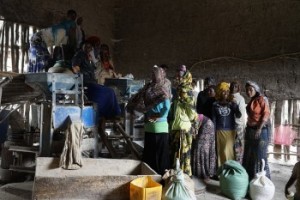
Initiative sheds light on how gender inequality influences capacity for agricultural innovation
 An international team of CGIAR researchers will delve deeply into the causes of gender disparity in the agricultural sector with a $1.1 million grant from the Bill & Melinda Gates Foundation.
An international team of CGIAR researchers will delve deeply into the causes of gender disparity in the agricultural sector with a $1.1 million grant from the Bill & Melinda Gates Foundation.
This grant adds to the investments of 11 CGIAR Research Programs (CRPs), the Government of Mexico; the Federal Ministry for Economic Cooperation and Development (BMZ); the World Bank and the CGIAR consortium office, to support an international collaborative research initiative known as “GENNOVATE: Enabling gender equality in agricultural and environmental innovation.” The project is engaging gender and social development specialists with 11 CRPs to identify practical actions which can strengthen the ability of agricultural research for development organizations to support poor rural women, men and youth to expand their power and capacity to access, take up and benefit from improved agricultural and natural resource management technologies and practices.
The initiative, which employs comparative qualitative research techniques, is advancing a new conceptual and methodological approach to illuminating how gender norms— i.e. the rules prescribing men’s and women’s expected roles and behaviors in their society – influence the ability of local people; men, women and youth; to innovate in their agricultural and natural-resource based livelihoods. The unprecedented CGIAR research collaboration has now mobilized fieldwork in more than 135 rural communities in 26 countries across Asia, Africa and Latin America, drawing on the views and experiences of nearly 8,000 rural women and men of different ages and socio-economic groups.
According to Lone Badstue, GENNOVATE project leader and strategic leader for gender research at the Mexico-based International Maize and Wheat Improvement Center (CIMMYT), “GENNOVATE will provide new evidence on how agricultural development processes are constrained by gender inequalities on the ground. Importantly, we will be able to compare these processes across the very diverse contexts reached by our field teams, and learn from those cases where both poor women and men demonstrate strong capacities for agricultural innovation—and in this process catalyze greater gender equality within their households and communities and higher farm yields. In this way, GENNOVATE contributes directly to the momentum and spirit embodied by International Women’s Day.”
For more information about CIMMYT see: https://www.cimmyt.org/
For more information, visit https://gender.cgiar.org/collaborative-research/gennovate/
